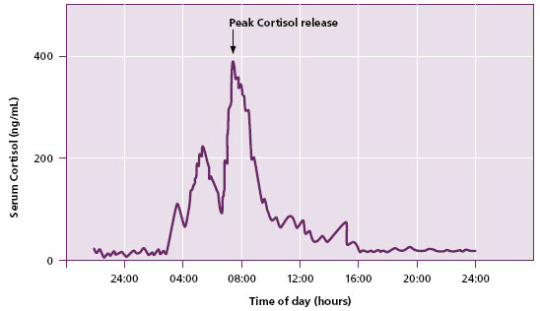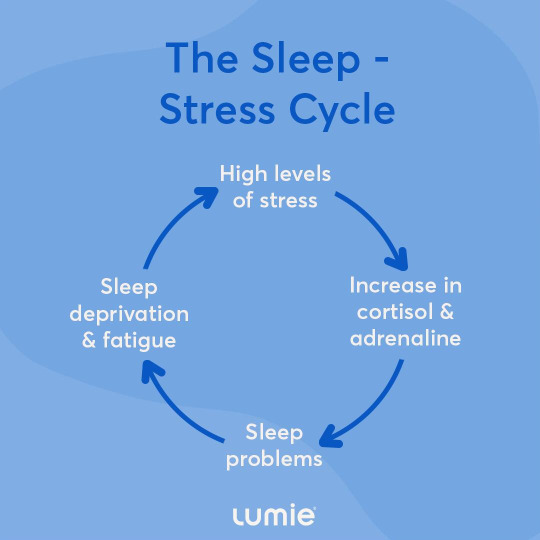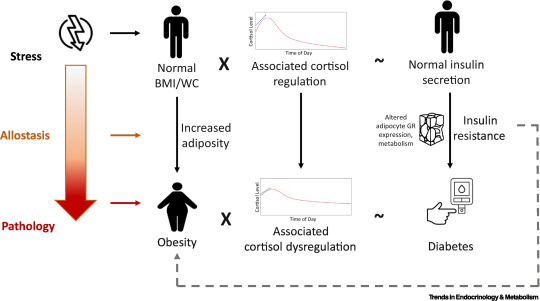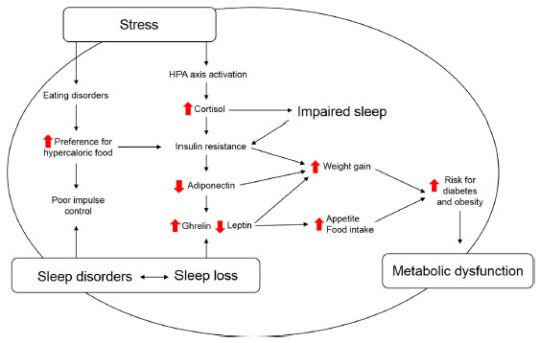#and its icking me because i said so many things without sources this like academic crime
Text
are you tired most of the time? is it hard to wake up in the mornings? is it hard to fall asleep at night? do you crave sweets and fats? are you getting depressed and anxious? is life stressful?
well, let me tell you about my scientific obsession of a few years: cortisol, which i assume, could be in the center of it all
cortisol is just your casual stress hormone, hanging around
but it has a wonderful daily pattern

as you can see this guy goes from 1 to 400 during the night to peak at 8am (in this graph), but in reality peaks like 30 minutes after you wake up, depending on your sleeping pattern. it does not follow the clock everyone is supposed to follow, it follows YOU, it follows your internal clock.
so, let's put the first thing together - cortisol is a stress hormone, and the peak in the morning is supposed to wake you up. stress in this case is NOT a bad stress, but rather something to make your body flowing and being ready to face the day.
so, what happens when you do not sleep?

Source: Klumpers, U. M., Veltman, D. J., van Tol, M. J., Kloet, R. W., Boellaard, R., Lammertsma, A. A., & Hoogendijk, W. J. (2015). Neurophysiological effects of sleep deprivation in healthy adults, a pilot study. PloS one, 10(1), e0116906.
Image annotation from the source: Individual saliva cortisol curves (grey line) and cortisol mean value (nmol/L) per Tx sampling point (solid line). Day 1 shows baseline cortisol sampling at T1-T7, day 2 shows effects of one night of total sleep deprivation on cortisol levels at T8-T14. T1, 2 and 3 comprise the cortisol awakening response (CAR). T8, 9 and 10 are sampled at identical time points the following day. T5 and T12 are sampled at 14.00hr, T6 and T13 at 17.00hr and T7 and T14 at 23.00hr. p values show effects of TSD, # p = 0.016.
The pic above shows the same cortisol levels in day 1 (control) and day 2 (after not sleeping one night).
As you can see, there is no peak. It's just a flat line. This means, no sleep gives you no awakening response, and it also applies to less sleep. The less you sleep, the lesser the awakening the response, the more tired you may feel during the day.
And you might say "oh but it feels the same when i sleep 10 hours or 4 hours so what's the difference". That's because you've luckily got to wake up in a point where your sleep phase is the lighter. How do you feel thorough the whole day? And if it is still the same, regardless of sleeping hours, for how long have you been not sleeping enough? There is such a thing as sleep debt, and if you're in it, you won't feel any better until you get that debt off.
The no morning peak happens because cortisol is produced during REM sleep (rapid eye movement sleep or the phase known for dreaming, although you can dream in other phases too). REM sleep also has this thing, where the phase gets longer and longer the more you sleep. So if you sleep less, the REM phase total length is going to be less, so less cortisol for the morning peak. This is why bad sleep quality (like waking up every once and then and not being able to sleep for long uninterrupted periods of time) also can do the same thing. Sleep duration is one of the main players, but it's not the only one.
Anyway, back to the point. Less sleep, harder to wake up, logical, right, you didn't need a cortisol graph for that.
However, notice how in day 1 the 6 and 7 time points is pretty much a straight line, like cortisol just reached the minimal level at the 6th time point. If you look at day 2, at time points 13 and 14, the slope is bigger, right?
You might think that's ridiculous, there is such a tiny slope difference between last two points in day 1 and day 2, that it shouldn't matter
BUT IT DOES!
Cortisol production, like many other things in our body work by negative feedback mechanism. Which means, when there is a lot of it, the brains get the "guys there is a lot of cortisol we should stop". But with sleep deprivation, there is not a lot of cortisol, and the brains don't get that signal, therefore, in the evening, the levels are a bit higher than they should be.
And what does having a bit higher levels of stress hormone, the be awake and alert hormone means in the evening? Guess what? You won't be able to fall asleep so easily!
So, the first vicious cycle involving cortisol regarding the information above: the less you sleep, the less you will be able to sleep.
But that leads to another thing: stress! Cortisol, the stress hormone, obviously, leads to stress. And the more you stress, the more cortisol, the higher the evening levels of cortisol. Which messes up your sleep cycle even more.
So voila, the first vicious cycle, visualized:

but it's not the end of it! oh boy it is not!
what comes with stress? eating problems!
how elevated cortisol in the evening plays a role in this? well, cortisol belongs to the glucocorticoid group. gluco sounds familiar, right, something to do with glucose right?
it makes more glucose available to the brain (which explains why it starts it peak during sleeping hours - while asleep we do not eat, but our brains are doing their thing, and thus cortisol skyrockets).
not only in the brain, but mostly everywhere, cortisol increases the glucose availability for tissues.
so cortisol makes the sugar be in your blood, but how else, besides the metabolism, can it make you get the sugar? by eating sweets of course! so you crave sugary foods!
you know what also promotes glucose in the blood? NOT insulin! so what cortisol does? blocks the thing. you know what insulin resistance and elevated glucose can do to a guy? make the guy diabetic!
also remember you are stressed, sleepy, crave sweets in elevated cortisol event, so you are less likely to have motivation for anything, including sports, so you are less likely to move, and more likely to gain some weight. and oh, how that makes it even more stressful, so voila, you add fuel to the vicious cycle
visualization here:

of course, there are other things involved, and the grand conclusion could be this:

Source: Hirotsu, C., Tufik, S., & Andersen, M. L. (2015). Interactions between sleep, stress, and metabolism: From physiological to pathological conditions. Sleep Science, 8(3), 143-152.
what can you do to get out of the cycle?
idk honestly. i'd suggest eating breakfast, because cortisol also spikes after meals (idk exactly why) and it can boost your morning cortisol levels to make the slope more pronounced (thus making the evening levels lower)
but most importantly - move. do something physical. there are mechanisms involved, trust me, i just don't want to write another post about them, but it actually helps. it doesn't mean you have to go to the gym and join a sports team, it could mean just taking long walks, maybe search some beginner yoga or whatever. just move around.
here is a pic of individual factors that play a role in this:

and while you can't really change your genetics, disorders, mental distress and most medication use, you can work on unhealthy lifestyle and intoxications
Source of the pic: Van der Valk, E. S., Savas, M., & van Rossum, E. F. (2018). Stress and obesity: are there more susceptible individuals?. Current obesity reports, 7, 193-203.
Image annotation from the source: Conceptual model of the interplay between the stress system and obesity. Various individual characteristics are proposed to play a role in initiating a vicious circle of increased activation of the stress system (both by perceived chronic stress as well as increased net glucocorticoid effect by either endogenous or exogenous GCs) and obesity in a bidirectional manner. Abbreviations: GC, glucocorticoid; SNP, single nucleotide polymorphism; OSA, obstructive sleep apnea
if you read this all i am open to marriage proposals, thank you
#long post#im sorry i did not feel like doing uni things and i got tried of academic writing#so im resorting to yelling on tumblr about. well. my academic passion lol#without proper citing and formating#and its icking me because i said so many things without sources this like academic crime#but like. i know these things. i researched them. im still researching them#cortisol
28 notes
·
View notes